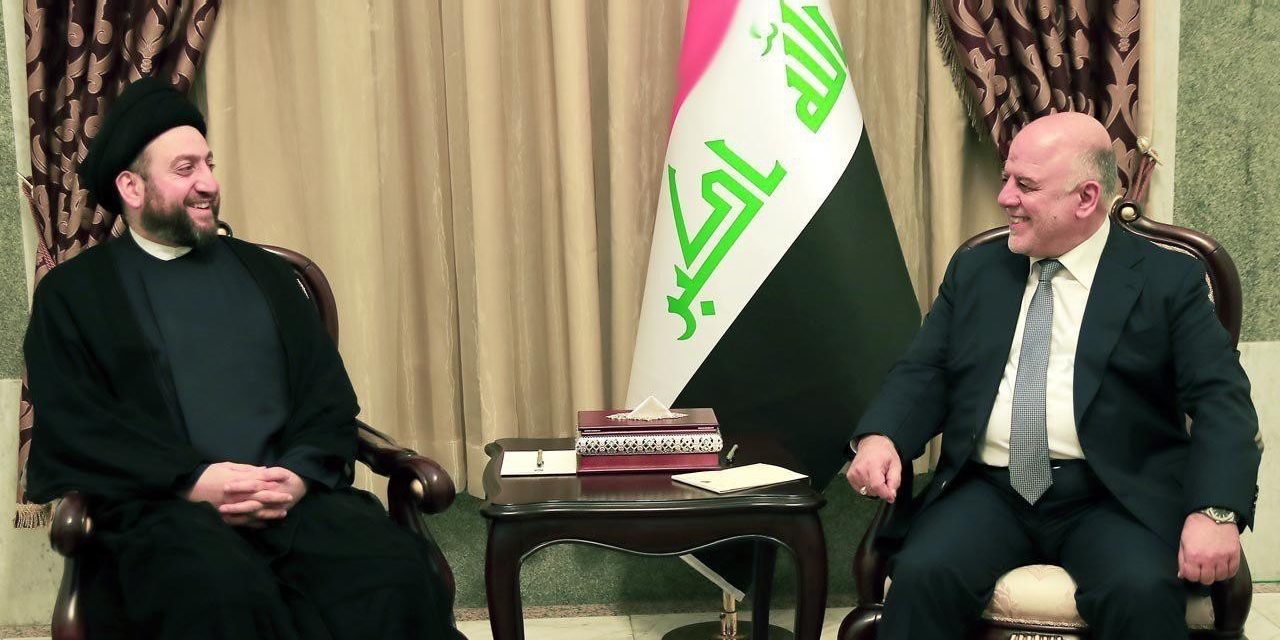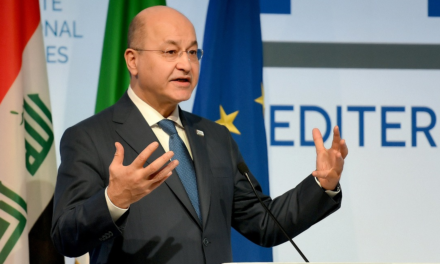One of the most critical flaws in Iraq’s political process is the absence of a real opposition. However, during Ramadan and the weeks following, new developments were taking place in Iraq’s political scene, spearheaded by former Prime Minister Haider Al-Abadi, head of Nasr coalition and Ammar Al-Hakim, head of Al-Hikma coalition and former ‘Al-Islah Alliance’ Chairman.
Ramadan in Iraq is known for hosting high profile politicians on popular political talk shows, who speak more openly than usual about the political developments in the country. Former Prime Minister Abadi appeared on several shows and escalated his criticism of the current government in a more direct way on a wide range of issues.
On Ahmed Mulla Talal’s show ‘Bil Harf Al-Wahid’ on May 8th 2019, Abadi described what he was doing as a “corrective effort”, opposing government policies and “not aiming to weaken it”. Abadi expressed his criticism about the government formation and the choice of candidates, questioning the wisdom of returning to ‘Muhasasa’ system after Adil Abd Al-Mahdi thanked the political blocs for giving him a free hand to choose his ministerial candidates. Instead, the current Prime Minister chose candidates that were not subject to background checks by the Integrity and Justice Commissions, leading to a long delay in the cabinet formation.
Furthermore, Abadi pointed out that while political blocs should take part in the cabinet formation negotiations, the rest of the posts in the government should be reserved for nonpartisan professionals. What is happening today, according to him, is that all posts, down to Director Generals, are being divided amongst certain political blocs. Abadi hinted that even Abd Al-Mahdi’s Chief of Staff, Muhammad Ridha Al-Hashimi, known as ‘Abu Jihad’, who is handling sensitive issues, was not chosen by the Prime Minister himself but forced upon him through ‘Muhasasa’.
As for the federal budget, Abadi described, at least the initial version of it, as “catastrophic” and expressed his curiosity as to why the government could not be “more responsible than parliament when allocating public money”. Abadi also criticized the supposed role of Iraq in the U.S./Iran crisis, questioning whether either side even wanted Iraq’s mediation, while Iraq’s top diplomats have been boosting about such a role in the past few months, with little to show for it.
In another show on Al-Iraqia State TV, called “The Fourth Wall”, Abadi criticized the performance of the current parliament, pointing out that although its work is based on parliamentary commissions, the head of these commissions have not yet been chosen even after one year of voting the parliament in. Abadi described this as a reflection of what is happening in the government which he described as “worse than Muhasasa” and “change for the sake of change and not with a specific purpose”, referring to open sales of government posts. Abadi also warned of a plan by the current government to undo the reforms he had made in the salary and pension system of high officials, saying that there was a committee formed by the Prime Minister’s Office reviewing the cutbacks he introduced during his term.
As for Hikma, criticism was the dominating style of political narrative since the Islamic Supreme Coucil of Iraq (ISCI) was one party with a strong presence in Iraqi politics. Even after ISCI split into Badr Organization, Al-Hikma Movement, and what is left of ISCI, Ammar Al-Hakim maintained the old political narrative after forming his new movement consisting mostly of young professionals. Less than two weeks ago however, Hikma effectively started to call itself opposition and took specific steps toward this regard.
On the 24th of June, Hakim wrote a message on the ‘official’ Whatsapp group of ‘Al-Islah Alliance’ announcing his resignation from the chairmanship of the alliance, that includes amongst others Muqtada’s ‘Sairoon’ and Abadi’s ‘Nasr’. In another tweet, Hakim called upon the political elite to “allow the opposition to start playing its role” and support it even when it is not performing as perfectly as it should, just like support the government received for 15 years despite its mistakes.
Since its early days, the current government has struggled and is now subject to large pressure. However, the recent escalation in opposing the policies of the government, the anticipation of a hot political summer, and talk about the possibility of voting out the current Prime Minister seems to have put enough pressure to make Abd Al-Mahdi deal at least with the issue of finalizing the government formation that has been pending for months. Except for the Ministry of Education, every ministry now has a minister, most importantly the ministries of Defense and Interior. It also pushed the government to publish its first report on the implementation if its program.
Although very limited, this shows how having an opposition can put some constructive pressure on the government and push certain issues forward. However, there are many pitfalls facing the establishment of a real opposition in Iraq. It is clear from Hakim’s narrative that he points out the opposition as a concept in Iraqi politics that has not yet been institutionalized as it should be in any democracy. However, everyone, including his party, was actively engaged in the game of Muhasasa that prevented a healthy democracy from developing in Iraq.
The ‘have one foot in the government, and the other in opposition’ approach that was used by political blocs to gain on the expense of the political process and that has worked for many is difficult to unlearn. As the Prime Minister himself said in his latest press conference, “[…] there are more commitments and limitations in the opposition than in the government.” Nevertheless, Iraq’s political process desperately needs an opposition and just like the government’s performance needs to improve, so does the effectiveness of the opposition.











